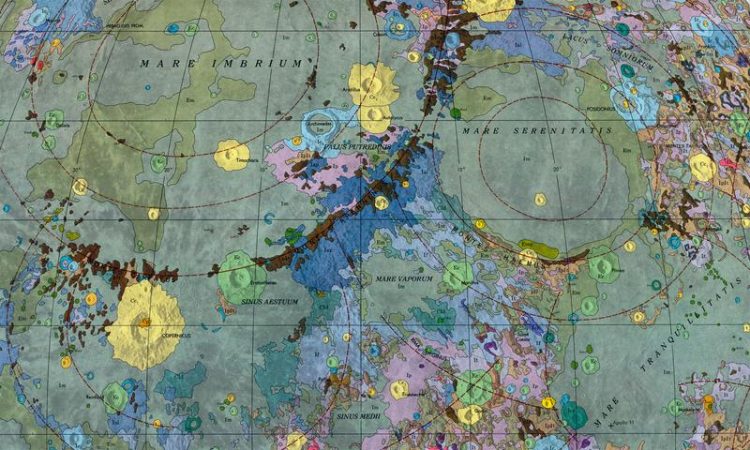Jacobs University supports new mapping of Mars, Mercury and the Moon

A map of a region of the Moon, including the Mare Imbrium ("Sea of Rains") Copyright: NASA/USGS
At present, the methodological approach for geological mapping of planetary surfaces is mainly based on techniques developed in the 1970s. This leaves wide room for improvement especially considering the great amount of highly complex data sets collected by modern instrumentation and sensors.
Also, official planetary geological maps are still coordinated almost exclusively by a single government organization in the USA, resulting in typically long publication time frames. “It is high time to improve this situation in order to maximize the scientific output, impact and practical use of planetary missions and improve the position of Europe in this context”, says Dr. Angelo Pio Rossi, Professor of Earth and Planetary Science at Jacobs University.
Geological maps provide the context for all observations and interpretations of surface and subsurface processes on any planetary body and their histories, directly supporting exploration. The innovative approach of the project is to integrate data from different sources.
The maps will include spectral information, elemental composition, absolute ages and ground truth information, characterizing potential landing sites and sites of interest of future robotic and human missions. They will also provide the basis for subsurface 3D geological modelling.
Jacobs University will act as deputy coordinator in the project and will coordinate the overall collaborative work. It will also lead the “data fusion” and sharing activities, i.e. the deep integration, visualization and interpretation of multiple 2D and 3D datasets for geological interpretation purposes.
An international team of scientist is working on “PlanMap”, as the project is called. It includes next to Jacobs University the Università degli Studi di Padova and the Istituto Nazionale di Astrofisica (both Italy), The Open University (United Kingdom), Westfälische Wilhelms-Universität Münster (Germany) and the Centre National de la Recherce Scientifique (France). PlanMap receives funding for 36 months from the European Union Horizon 2020 research program.
Further information:
http://www.planmap.eu
https://twitter.com/planmap_eu
Questions will be answered by:
Dr. Angelo Pio Rossi | Professor of Earth and Planetary Science an.rossi@jacobs-university.de | Tel.: +49 421 200-3153
Book:
Planetary Geology, edited by Angelo Pio Rossi and Stephan van Gasselt, Springer, ISBN 978-3-319-65177-4, 433 pages
About Jacobs University:
Jacobs University is a private, independent, English-language university in Bremen. Young people from all over the world study here in preparatory, Bachelor, Master, and PhD programs. Internationality and transdisciplinarity are special features of Jacobs University: research and teaching don’t just pursue a single approach, they address issues from the perspectives of multiple disciplines. This principle makes Jacobs graduates highly sought- after new talents who successfully strike out on international career paths.
Thomas Joppig | Jacobs University Bremen gGmbH
Corporate Communications & Public Relations
t.joppig@jacobs-university.de | Tel.: +49 421 200-4504
Media Contact
All latest news from the category: Earth Sciences
Earth Sciences (also referred to as Geosciences), which deals with basic issues surrounding our planet, plays a vital role in the area of energy and raw materials supply.
Earth Sciences comprises subjects such as geology, geography, geological informatics, paleontology, mineralogy, petrography, crystallography, geophysics, geodesy, glaciology, cartography, photogrammetry, meteorology and seismology, early-warning systems, earthquake research and polar research.
Newest articles

A universal framework for spatial biology
SpatialData is a freely accessible tool to unify and integrate data from different omics technologies accounting for spatial information, which can provide holistic insights into health and disease. Biological processes…

How complex biological processes arise
A $20 million grant from the U.S. National Science Foundation (NSF) will support the establishment and operation of the National Synthesis Center for Emergence in the Molecular and Cellular Sciences (NCEMS) at…

Airborne single-photon lidar system achieves high-resolution 3D imaging
Compact, low-power system opens doors for photon-efficient drone and satellite-based environmental monitoring and mapping. Researchers have developed a compact and lightweight single-photon airborne lidar system that can acquire high-resolution 3D…





















